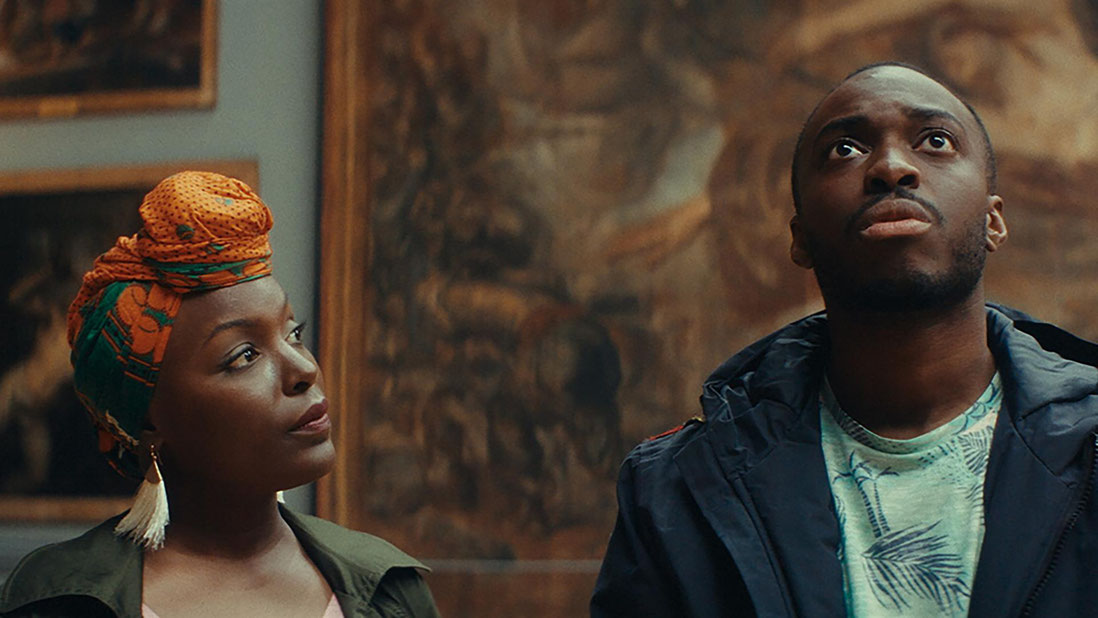The intrusion of Past into Present: Juwaa, a film by Nganji Mutiri
 Juwaa directed by Nganji Mutiri was in competition at DIFF 2022
Juwaa directed by Nganji Mutiri was in competition at DIFF 2022
[During six weeks, four Durban Talent Press were mentored by a cofounder of AWOTELE to write film critics.
They wrote about their favourite film, Juwaa, directed by Congolese/Belgian director Nganji Mutiri,
winner of Best Actress Award at Durban International Film Festival 2022. Discover Rutamu Uwera Fabiola‘s piece about this feature.]
Nganji Mutiri, a character in this film, alongside the comedian Edson Anibal (Amani) known for his role in Earth and Blood (2020) and Capitani (season 2) on Netflix and the Guinean-Bissau Belgian actress Babetida Sadjo (Riziki) who is known for the Netflix drama thriller Into the Night (2020) paints us a multilayered intimate portrait of reunion between a son and a mother in Juwaa.
Juwaa (2021) is a first feature drama film directed by Nganji Mutiri, a Congolese director, actor, and multidisciplinary artist based in Belgium. It is inspired by Mutiri’s personal life and a healing journey that followed a traumatic attack that occurred in his family in 1996 and compelled them to flee from Kinshasa, Congo to find refuge in Belgium. Mainly scripted in French, and a few sentences in Kiswahili, with English subtitles, the director shot one part of this film in Congo and another part in Belgium.
Riziki (Babetida Sadjo), an investigative journalist, whose article cost her greatly including her husband, is compelled to flee Kinshasa to Belgium and leave behind his only 10 years old son Amani (Edson Anibal) behind, a necessary risk that would be deemed unforgivable by her son, even by herself.
Riziki, an established author is now settled in Belgium, after many years her son Amani joins her but there are so many layers of trauma and unsaid feelings that get between their relationship. They obviously love each other but they cannot afford to be vulnerable with each other. The 20 years old Amani has so many unanswered questions about his deceased father, his identity, and how to fit in a foreign country and in her mother’s life who reinvented herself and now married to Raphael. He tries to pursue new relationships with other African folks based in Belgium, but nostalgic and fond of his Congolese roots, he would sometimes find himself questioning their “Africanness”. Praying to the ancestors makes more sense to him than praying to Jesus.
Juwaa (“Jua” meaning “sun” in Kiswahili) explicitly demonstrates how the past keeps intruding into our present and how unhealed wounds resurfaces into our behaviors, and how it affects how we relate to one another. The filmmaker uses flashbacks to depict the beautiful and healthy relationship Riziki and Amani had before the traumatic night attack, all the same filling the characters’ silences, depicting the weight of what they witnessed during the attack.
With close-up shots and zoomed in facial expressions, the camera sympathetically captures the vulnerability of the characters. From the genuine script to the characters’ perfect performance, the film authentically portrays the layers of complexities involved in the healing process. Amani blames his mother for not telling him anything about his deceased father, on the other hand Riziki cannot afford to relive the traumatic events. The film raises questions about collective healing: How can we help each other to heal? Is it possible to have a shared future after sharing a traumatic past?
Riziki and Amani’s complex relationship will hopefully validate those who are still struggling with the intrusion of the past into their day-to-day life by showing them that healing is not linear.
Currently in official competition, in feature film category at the 2022 Durban International Film Festival (DIFF), this first feature film of Nganji Mutiri has been globally embraced since its world premiere at the 27th edition of the Pan-African Film and Television Festival of Ouagadougou 2021 (FESPACO, Burkina Faso), its screening in European premiere at the Mons International Film Festival,(Belgium) and at the 29th New York African Film Festival 2022 (NYAFF, USA), as well its Audience Award won at the Belgian Afrika Filmfestival 2022.